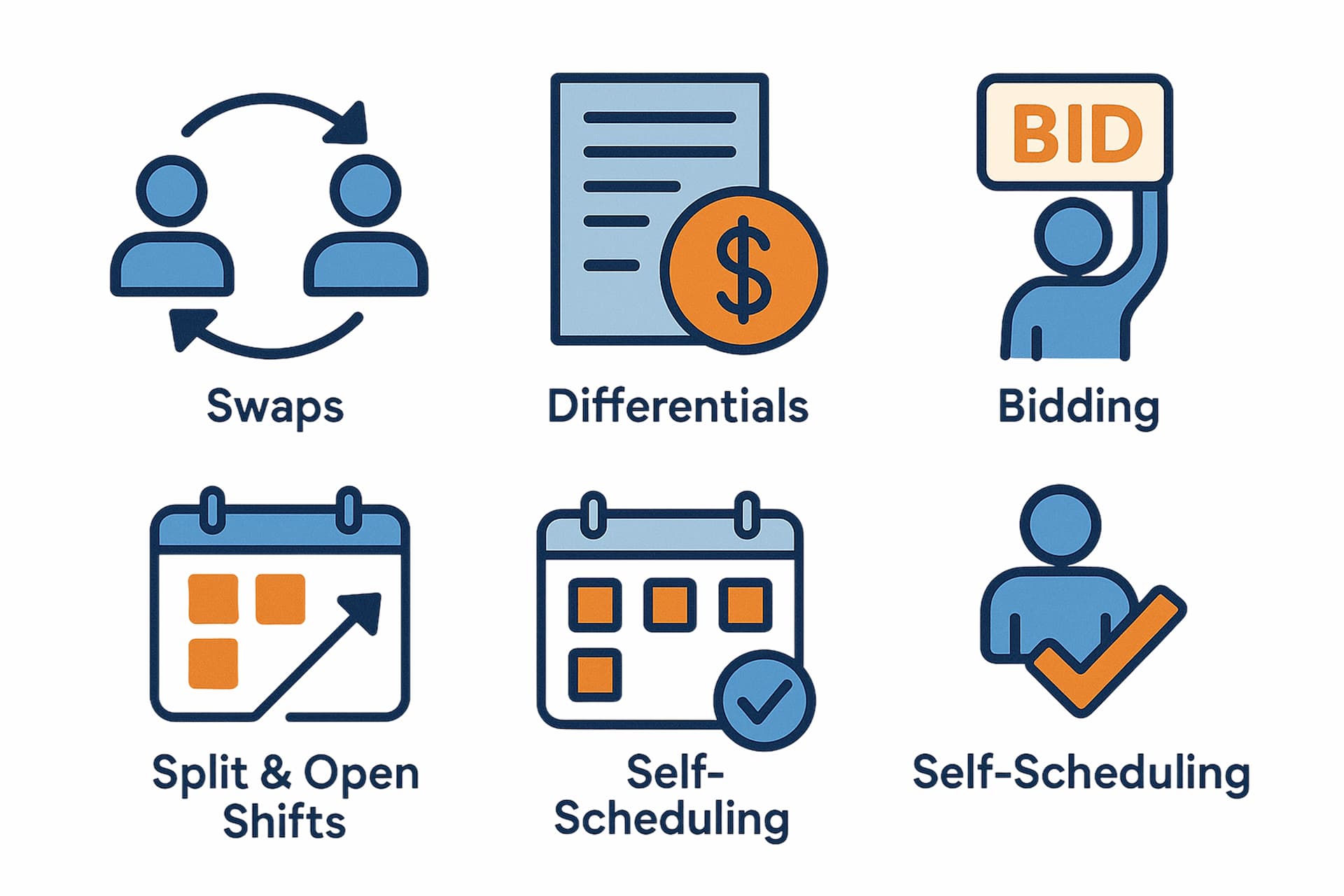Minimum Wage
Effective January 1, 2025, the Illinois minimum wage is $15.00 per hour for most employees.
Updated statewide rules: All adults 18+ receive $15/hr, while minors under 18 working less than 650 hours per year receive $13/hr. Illinois updates the rates annually based on legislation.
Local overrides: Chicago and Cook County maintain higher rates with CPI-based adjustments. Chicago's rate is $16.60/hr as of July 2025.
Posting requirements: Employers must display current minimum wage posters in conspicuous locations and update payroll immediately upon annual changes.
Recordkeeping: Employers must track hours, wages, corrections, training time, prep time, and any off-the-clock work for at least 5 years.
Enforcement: Employees may file wage claims up to 3 years after a violation; penalties include 5% per month of unpaid wages plus administrative fees.
Tipped Minimum Wage
Illinois allows a reduced tipped minimum wage as long as tips bring employees to the full required minimum wage.
State tipped minimum wage: $9.00/hr (60% of minimum wage) as of January 1, 2025.
Tip credit rules: Employers must ensure tips + base rate reach $15/hr, or they must make up the difference. Employers can take a tip credit of up to 40%.
Restrictions: Tip pooling must follow strict rules; mandatory service fees are not considered tips and cannot be used for tip credit.
Chicago phase-out: The city has higher rates for tipped workers ($12.62/hr as of July 2025) as part of narrowing the tip credit gap.
Training wage: Employers may pay $9.00/hr for the first 90 days if applying tip credit, or $14.50/hr without tip credit.
Overtime Laws
Illinois follows federal overtime rules requiring 1.5× pay for hours over 40 in a workweek.
Standard rule: 1.5× pay for all hours over 40 in a workweek, calculated Sunday through Saturday unless otherwise defined by employer.
Exempt vs non-exempt: Salary alone does not equal exemption. Job duties and minimum salary thresholds determine exemption status under both state and federal law.
No comp time: Private employers may not replace overtime pay with future time off ("comp time"). Public sector has different rules.
On-call rules: On-call time may be compensable if the employee's freedom is significantly restricted and they cannot use the time effectively for personal purposes.
Holiday and weekend work: Not automatically overtime unless it puts the employee over 40 hours for the workweek. Employer policies may provide additional pay.
Meal & Rest Breaks
Illinois requires a minimum 20-minute meal break for employees working 7.5 continuous hours.
Mandatory break timing: One 20-minute unpaid break no later than 5 hours after the beginning of the shift for employees working 7.5+ hours.
Additional breaks: One extra 20-minute break for every additional 4.5 hours beyond the initial 7.5 hours worked.
Break must be uninterrupted: Employee must be completely relieved of all duties. If required to remain on duty or respond to work, the break must be paid.
Nursing mothers: Reasonable paid breaks and a private space (not a bathroom) must be provided for expressing breast milk for up to 1 year following childbirth.
Documentation: Employers should document break waivers in writing and maintain records of meal periods provided to demonstrate compliance.
One Day Rest in Seven Act (ODRISA)
Illinois requires at least 24 consecutive hours of rest for each 7-day work period.
One rest day: Employees must receive 24 consecutive hours of rest in every consecutive 7-day period (not calendar week).
Meal break requirement: ODRISA enforces the 20-minute meal break for every 7.5+ hour shift, with additional breaks required for longer shifts.
Voluntary seventh day: Employees may voluntarily work on their designated rest day only if employer allows and proper documentation exists.
Posting requirement: Employers must post ODRISA notices explaining employee rights and how to file complaints with IDOL.
Penalties: Each non-compliant 7-day period counts as a separate violation. Penalties range from $250-$500 depending on employer size, per violation, per employee.
Leave Laws
Illinois has multiple paid and unpaid leave laws, including the Paid Leave for All Workers Act (PLAWA).
PLAWA: Effective January 1, 2024, provides 40 hours (5 days) of paid leave yearly for any reason. Employees accrue 1 hour per 40 hours worked.
Chicago enhanced rules: Chicago requires 40 hours of paid sick leave plus 40 hours of general paid leave annually for covered employers.
Sick leave for caregiving: Under the Employee Sick Leave Act, employees can use employer-provided sick leave to care for family members.
Family Bereavement Leave: Up to 2 weeks unpaid leave (10 working days) for death of covered family member. Up to 6 weeks if multiple deaths occur.
VESSA: Victims' Economic Security and Safety Act provides up to 12 weeks unpaid leave for domestic violence, sexual assault, or stalking situations.
Military leave: Illinois Service Member Employment and Reemployment Rights Act (ISERRA) provides protections equal to or greater than federal USERRA.
Donation leave: Organ donors may take up to 10 days paid leave; blood/platelet donors receive 1 hour per donation (every 56 days).
Child Bereavement Leave: Up to 2 weeks unpaid leave for death of a child or stillbirth/miscarriage.
Child Labor Laws
Illinois heavily regulates employment of minors under 16 through the Child Labor Law.
Employment certificate required: All minors under 16 must obtain an employment certificate (work permit) from their school district or designated issuing officer before beginning work.
Hour restrictions: 14-15-year-olds may work maximum 3 hrs/day on school days, 8 hrs on non-school days, 24 hrs/week during school weeks, 48 hrs/week during school breaks.
Time restrictions: No work before 7 AM or after 7 PM on school nights. Extended to 9 PM from June 1 through Labor Day.
Prohibited work: Includes hazardous machinery, manufacturing, driving, construction, mining, logging, and certain food service equipment.
Required break: 30-minute meal break required after 5 continuous hours of work for minors.
Employer responsibilities: Maintain copies of employment certificates, ensure safe working conditions, follow all hour/time limits, keep accurate records.
Penalties: Up to $10,000 per violation. Increased penalties for hazardous work violations or repeat offenders.
Pay & Wage Rules
Illinois regulates pay frequency, deductions, paystubs, and final pay deadlines under the Wage Payment and Collection Act.
Pay frequency: Non-exempt employees must be paid at least semi-monthly (twice per month). Exempt employees must be paid at least monthly.
Final paycheck: Must be issued on the next regularly scheduled payday following separation, regardless of reason for termination.
Vacation payout: Earned, vested vacation time is considered wages and must be paid out at termination unless employer policy clearly states forfeiture.
Pay stubs: Must show gross wages, hours worked, pay rate, all deductions, net pay, year-to-date totals, and employer information.
Allowed deductions: Only taxes, court-ordered garnishments, insurance premiums, retirement contributions, or written employee-authorized deductions are permitted.
Prohibited deductions: Cannot deduct for cash shortages, damaged property, uniforms, or tools without specific written authorization and limitations.
Wage garnishment: Limited to lesser of 15% of gross wages or amount above 45× state minimum wage per week ($675 for 2025).
Recordkeeping: Employers must keep payroll records for 5 years including hours worked, wages paid, and all deductions.
Hiring & Firing
Illinois is an at-will employment state with important restrictions on background checks, discrimination, and hiring practices.
Hiring requirements: Employers must comply with I-9 verification, E-Verify (if applicable), and anti-discrimination laws during hiring process.
Salary history ban: Employers cannot ask about or screen applicants based on previous wages or salary history.
Criminal history: Job Opportunities for Qualified Applicants Act prohibits asking about criminal history on initial applications. Timing restrictions apply.
At-will employment: Either party can terminate employment at any time for any lawful reason or no reason, unless modified by contract or law.
Wrongful termination: Termination is illegal if based on protected characteristics, retaliation for protected activity, or violation of public policy.
Anti-retaliation: Cannot terminate for reporting violations, filing workers' comp claims, taking protected leave, or engaging in protected concerted activity.
Notice requirements: WARN Act requires 60 days notice for mass layoffs (75+ employees). Illinois has additional plant closing notification requirements.
Workers' Compensation
All Illinois employers with employees must carry workers' compensation insurance coverage.
Required coverage: All employers must carry workers' compensation insurance, regardless of number of employees. Independent contractors are generally not covered.
Benefits include: Medical care, temporary total disability (TTD), permanent partial disability (PPD), permanent total disability (PTD), rehabilitation, and survivor benefits.
Reporting requirements: Employees must notify employer within 45 days of injury. Employers must report to insurance carrier immediately and file required forms with IWCC.
No retaliation: Employers cannot terminate or retaliate against employees for filing legitimate workers' compensation claims.
Dispute resolution: Illinois Workers' Compensation Commission (IWCC) handles disputes through arbitration hearings, with appeal options available.
Unemployment Insurance
Illinois employers must pay unemployment taxes and maintain proper records for the unemployment insurance system.
Administered by: Illinois Department of Employment Security (IDES) oversees the unemployment insurance program.
Employer obligations: Register within 30 days of hiring, file quarterly wage reports, pay unemployment taxes, maintain employment records for 4+ years.
Employee eligibility: Must be unemployed through no fault of their own, have sufficient base period wages, be able and available for work, and actively seeking employment.
Benefit amounts: Based on highest earning quarter in base period. Maximum weekly benefit amount changes annually (approximately $484 in 2025).
Contesting claims: Employers can contest claims by providing documentation of misconduct or voluntary quit. Response time limits apply.
Workplace Rights & Safety
Illinois protects employees against discrimination, harassment, and unsafe work conditions through multiple laws.
IHRA protections: Illinois Human Rights Act provides broad anti-discrimination protections covering race, color, religion, sex, national origin, ancestry, age (40+), marital status, disability, sexual orientation, gender identity, military status, order of protection status, pregnancy, and unfavorable discharge.
Mandatory harassment training: Annual sexual harassment prevention training required for all Illinois employers. Model training available from IDHR.
Safety standards: Private employers follow federal OSHA; public sector employers follow Illinois Department of Labor safety regulations.
Whistleblower protections: Employees cannot be punished for reporting violations of law, unsafe conditions, or participating in investigations.
Equal pay: Illinois Equal Pay Act requires equal pay for substantially similar work regardless of gender. Pay transparency protections apply.
Retaliation prohibited: Strictly prohibited for filing discrimination charges, participating in investigations, or opposing discriminatory practices. Penalties can be severe.
Employment Contracts & Severance
Illinois is an at-will state, but employment contracts and restrictive covenants must meet strict statutory requirements.
Non-compete restrictions: Illinois Freedom to Work Act limits non-competes to employees earning more than $75,000/year (adjusted annually for inflation). Threshold increases to $90,000 by 2027.
Non-solicitation limits: Non-solicitation agreements only permitted for employees earning $45,000+ annually (threshold increases to $52,500 by 2027).
Review period required: Employees must receive at least 14 days to review restrictive covenant agreements before employment begins or accepting continued employment.
Legal counsel advisement: Employers must advise employees in writing to consult with an attorney before signing restrictive covenants.
Severance pay: Not required by law unless stated in employment contract, collective bargaining agreement, or established employer policy.
Consideration required: Restrictive covenants signed after employment begins must be supported by adequate consideration (typically 2+ years continued employment).



